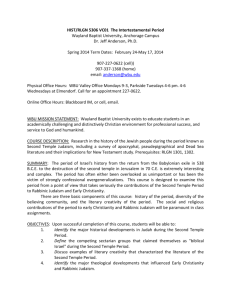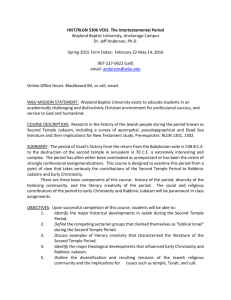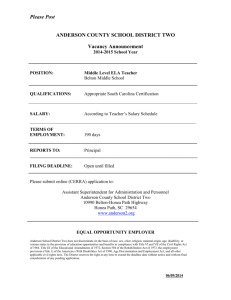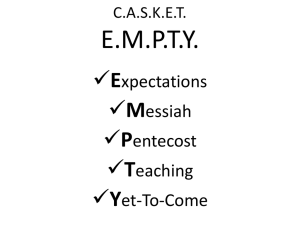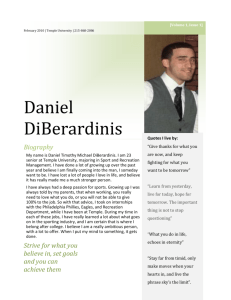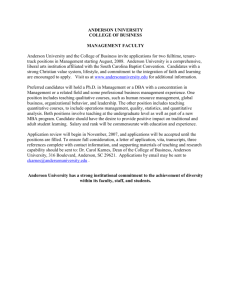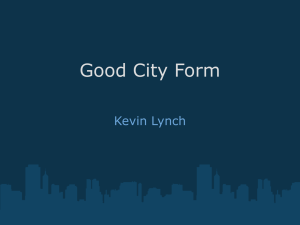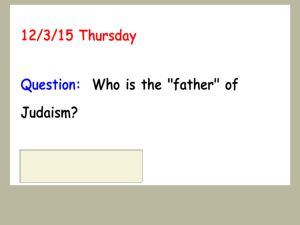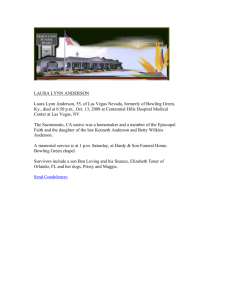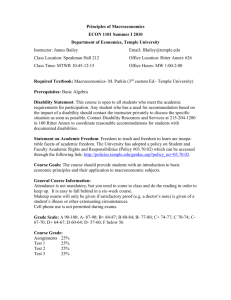Intertestamental Period - Wayland Baptist University
advertisement
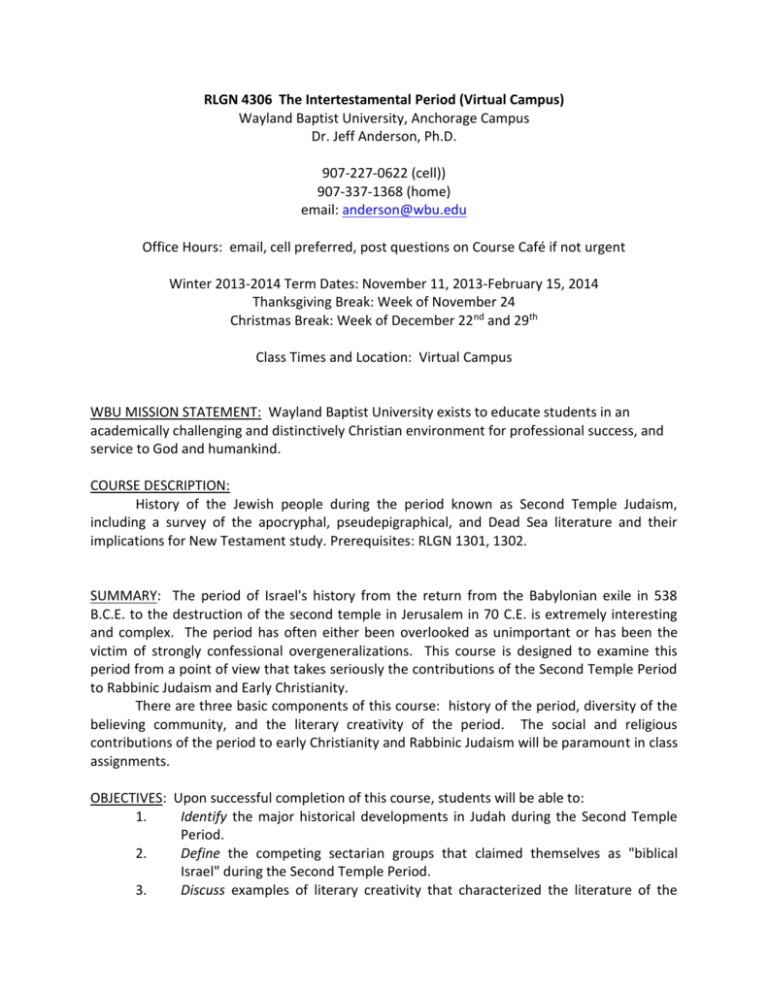
RLGN 4306 The Intertestamental Period (Virtual Campus) Wayland Baptist University, Anchorage Campus Dr. Jeff Anderson, Ph.D. 907-227-0622 (cell)) 907-337-1368 (home) email: anderson@wbu.edu Office Hours: email, cell preferred, post questions on Course Café if not urgent Winter 2013-2014 Term Dates: November 11, 2013-February 15, 2014 Thanksgiving Break: Week of November 24 Christmas Break: Week of December 22nd and 29th Class Times and Location: Virtual Campus WBU MISSION STATEMENT: Wayland Baptist University exists to educate students in an academically challenging and distinctively Christian environment for professional success, and service to God and humankind. COURSE DESCRIPTION: History of the Jewish people during the period known as Second Temple Judaism, including a survey of the apocryphal, pseudepigraphical, and Dead Sea literature and their implications for New Testament study. Prerequisites: RLGN 1301, 1302. SUMMARY: The period of Israel's history from the return from the Babylonian exile in 538 B.C.E. to the destruction of the second temple in Jerusalem in 70 C.E. is extremely interesting and complex. The period has often either been overlooked as unimportant or has been the victim of strongly confessional overgeneralizations. This course is designed to examine this period from a point of view that takes seriously the contributions of the Second Temple Period to Rabbinic Judaism and Early Christianity. There are three basic components of this course: history of the period, diversity of the believing community, and the literary creativity of the period. The social and religious contributions of the period to early Christianity and Rabbinic Judaism will be paramount in class assignments. OBJECTIVES: Upon successful completion of this course, students will be able to: 1. Identify the major historical developments in Judah during the Second Temple Period. 2. Define the competing sectarian groups that claimed themselves as "biblical Israel" during the Second Temple Period. 3. Discuss examples of literary creativity that characterized the literature of the 4. 5. Second Temple Period. Identify the major theological developments that influenced Early Christianity and Rabbinic Judaism. Outline the diversification and resulting tensions of the Jewish religious community and the implications for issues such as temple, Torah, and cult. TEXTBOOKS: The following texts will be required: New Oxford Annotated Bible, with Apocrypha, NRSV 4th Edition. New York: Oxford, 2010. (Actually any Bible with the Apocrypha will do. Make sure it has all the Apocryphal books assigned.) Anderson, Jeff. The Internal Diversification of Second Temple Judaism. Lanham, MD: University Press of America, 2002. . There is a great deal of reading in this course. It’s the only way for you to get comfortable with the sources. Make sure you have the time to do the reading. INFORMATION TECHNOLOGY: Students are invited to access these web sites. The most important of these, The American Theological Library Association, can be accessed through the WBU learning resource center, www.wbu.edu/lrc. Other relevant sites: Society of Biblical Literature: www.sbl-site.org The Josephus Home Page (Yes, Virginia, Josephus has his own home page) http://members.aol.com/fljosephus/home.htm. Model of Herod’s Temple in Jerusalem. http://www.holylandnetwork.com/temple/model.htm Masada Home Page: http://www.jewishvirtuallibrary.org/jsource/Archaeology/Masada1.html Educational Site on the Dead Sea Scrolls: http://www.usc.edu/dept/LAS/wsrp/educational_site/dead_sea_scrolls/ REQUIREMENTS 1. Exams. There will be two exams for the course. They will not be cumulative. Exams will exclusively be over the Anderson text and lectures. 2. Research Paper. A research paper is required. 10-12 pages. Paper will follow the WBU in-house style guide approved by the Division of Religion. Topics not on this list will need to be approved by the instructor. Due NLT Feb 8. Please note: Undergraduate students, if you have not had RLGN 0001, Religion Writing Lab, you MUST take it in conjunction with this class. That’s a Division of Religion requirement. I will be happy to review carefully edited drafts. Ideas for Research Papers: Herod the Great Hillel Synagogues Masada Cyrus the Mede Antiochus III Antiochus IV The Community at Qumran Philo of Alexandria Introduction to a selected book of the Apocrypha Introduction to a selected book of the Pseudepigrapha Jubilees 1 Enoch 2 Baruch The Maccabean Revolt Josephus Christianity as a Jewish Sect The Jewish Revolt of A.D. 66-73 The Second Jewish Revolt The Samaritans The Septuagint The Influence of Hellenism on Second Temple Judaism Intermarriage and Second Temple Judaism The Elephantine Papyri The Pirque Avot (Ethics of the Fathers) Zoroastrians Herodium Bar Kokhba Zerubabbel Yavneh Oniads and Tobiads Zenon 3. Discussion Question Response Essays: There are several discussion questions assigned with the readings. I am looking for personal impressions based on specific evidence from the literature assigned. These specific references will tell me how carefully you read the material. Do not just respond with general impressions only. GRADING EXAMS FINAL PAPER READING ASSIGNMENTS 100 points EACH 100 points 100 points COURSE SCHEDULE/ASSIGNMENTS Week 1: Week of November 11 Babylonian Exile and Its Effects Persian Period and Judean Community Read Anderson Chapter 1: The Second Temple Period: Terminology and Misconceptions. Read Anderson Chapter 2: Judaism under Persian Sovereignty Read the Book of Malachi Discussion Questions: 1. What would you say is the religious setting of the book of Malachi? 2. How does the book of Malachi end? What does this mean since it’s the last book of the Old Testament? Week 2: Week of November 17 Invasion of Hellenism: Breakdown of Consensus Judea Under Ptolemies/Seleucids Maccabean Period/Jewish Independence Read Anderson Chapter 3: Alexander and the Rise of Hellenism Read Anderson Chapter 4: The Maccabean Revolt and the Hasmonean Dynasty Read Grabbe, chapter 1 [grad students only] Read I and II Maccabees in Apocrypha Discussion Questions: 1. What is the perspective of these books toward Hellenism? Cite some examples. 2. How are the genres of these two books different? 3. What is the purpose of the martyr stories of 2 Maccabees? . Week 3: Week of December 1 The Hasmoneans The Roman Period Second Destruction and Its Implications Read Anderson Chapter 5: The Roman Domination of Judea Read Tobit, Judith in Apocrypha Read Grabbe, chapter 2 [grad students] Discussion Questions 1. Both Tobit and Judith deal with how Jews should live in a foreign/pagan environment. How is this so? 2. Is Judith and example of a pious Jewess? Why or Why not? 3. Is could be said that Tobit, Tobias, and Sarah all live happily ever after. What ethical lessons can be learned by this story? Week 4: Week of December 8 The Internal Diversification of Judaism Returning Exiles and People of the Land Read Anderson Chapter 6: Breakdown of Consensus: Roots of Diversification Read Anderson Chapter 7: The Internal Diversification of Judaism: Issues that Divided the Judean Communities Read Grabbe, chapter 3 [grad students] Read Ezra 1-6, Nehemiah Read 1 Esdras in Apocrypha Discussion Questions: 1. What tensions do you see between the returning exiles and the people who had remained in Palestine? 2. What kinds of topics are covered in 1 Esdras that are not present in the biblical materials. 3. How does Nehemiah react to the problem of exogamy? Week 5: Week of December 15 The Dead Sea Scrolls Essenes and Qumran Read Anderson Chapter 8: Schism and Heterogeneity: Judaisms of the Second Temple Period Tour Dead Sea Scroll Exhibit at www.loc.gov/exhibits/scrolls/ Read Grabbe, Chapter 4 [grad students] Tour the Shrine of the Book at http://www.imj.org.il/eng/shrine/ Discussion Questions: 1. Discuss the rigors of admission into the community of Qumran. What strikes you as surprising regarding these difficult standards of admission? 2. What is one impact of the discovery of the Dead Sea Scrolls on Old Testament Studies? Week 6: Week of January 5 Mid Term Examination (Offered through Blackboard. Make sure you get the study sheet. I’ll post it.) Samaritans Pharisees/Sadducees/Zealots/Enochic Groups Judean Communities in Egypt Read Jeremiah 42:1-44:30 Read Baruch, Letter of Jeremiah, Discussion Question: 1. How do the Jeremiah readings portray those Judeans who fled to Egypt? . Week 7: Week of January 12 Hillel and Jesus Emergence of Rabbinic Judaism Read Anderson Chapter 9: Hillel and Jesus: Forerunners to Rabbinic Judaism and Early Christianity Read Grabbe, chapter 5 [grad students] Read Hebrews Discussion Questions: 1. What are some of the major institutions of Judaism that you recall Hebrew discusses? How does the ministry of Christ fulfill these institutions? 2. What traditions does Christianity share with Judaism? 3. Contrast the self-identity of the Early Christians and the Qumran community in regard to the priesthood, temple, and sacrifice. Week 8: Week of January 19 From Religious Literature to Sacred Scripture: Canon Apocrypha Septuagint Scriptural Interpretation: Targums, Peshers, Midrash, New Testament Read Anderson Chapter 10: Scripture and Canon Read Ecclesiasticus (Ben Sira)from Apocrypha Discussion Questions: 1. How does wisdom relate to the Torah in Ben Sira? 2. How does Ben Sira view women? 3. In what ways does the Genesis Apocryphon expand on the Primeval History of Genesis? Week 9: Week of January 26 Pseudipigrapha Read Anderson Chapter 11: Developments in the Interpretation of Sacred Scripture Read Additions to Daniel and 4 Maccabees in Apocrypha Discussion Questions 1. Which of the additions to Daniel is your favorite and why? 2. Familiarize yourself with some of the arguments related to the dating of the book of Daniel. What position do you find the strongest and why? Week 10: Week of February 2 Theological Developments Apocalyptic Torah Messianism Theodicy Wisdom Read Anderson Chapter 12: Theological Innovation in the Second Temple Period Research Papers Due February 8 Read 2 Esdras from Apocrypha Wisdom of Solomon from Apocrypha Discussion questions 1. How does the Wisdom of Solomon lay the theological groundwork for the idea of the immortality of the soul? 2. What would you say the genre and theme of 2 Esdras is? Why? 3. What are some parallels in Wisdom to teachings in the New Testament? Week 11: Week of February 9 (You did it! Congratulations! Now go buy some new reading glasses.) Final Examination. Take final examination. Exam is offered through Blackboard. I’ll give instructions later. NOTICE TO STUDENTS EXPERIENCING DISABILITIES It is the University’s policy that no otherwise qualified person experiencing disabilities be excluded from participation in, be denied the benefits of, or be subject to discrimination under any educational program or activity in this University. If a student has an impairment that would require additional accommodations by the instructor and or the University, then please inform the instructor, or Campus Dean, prior to the first class session. STATEMENT TO UNDERGRADUATE STUDENTS TO RETAIN RESEARCH PAPERS WBU degree seeking students are strongly encouraged to retain copies of all research papers. To graduate from WBU, students must complete the senior Exit Seminar, Grad 4101. The Exit Seminar is designed to capstone a student’s discipline knowledge through the completion of a discipline portfolio or the completion of an approved research project. The research papers retained from previous courses, particularly courses within the discipline will aid the student in completing the GRAD 4101 course. For more information on the Exit Seminar, Grad 4101, speak with a WBU academic advisor. STATEMENT TO STUDENTS ON HONEST/ETHICAL BEHAVIOR Please be aware that academic dishonesty and breaches of professional ethics will not be tolerated in this course. Students are expected to promote academic honesty by not participating or facilitating other’s participation in any act of academic dishonesty, and by reporting instances of academic dishonesty to the professor. This means that any work a student submits to a professor must be exactly what it claims to be. It must be entirely the student’s work and be appropriately cited. This danger is particularly insidious in an Internetbased class. See Academic Catalog. TEXTBOOK POLICY Wayland-Anchorage students who choose to purchase textbooks from a vendor other than the Wayland bookstore run the risk of getting the wrong book and/or having the book arrive late— after the course has started. Students should also be aware that they will normally have to pay extra expenses after they have the book, in order to connect to web sites and use other required materials associated with the textbook. These extra expenses are not well advertised and often catch students off guard. All students are responsible to have required course materials in hand by lesson 1.
